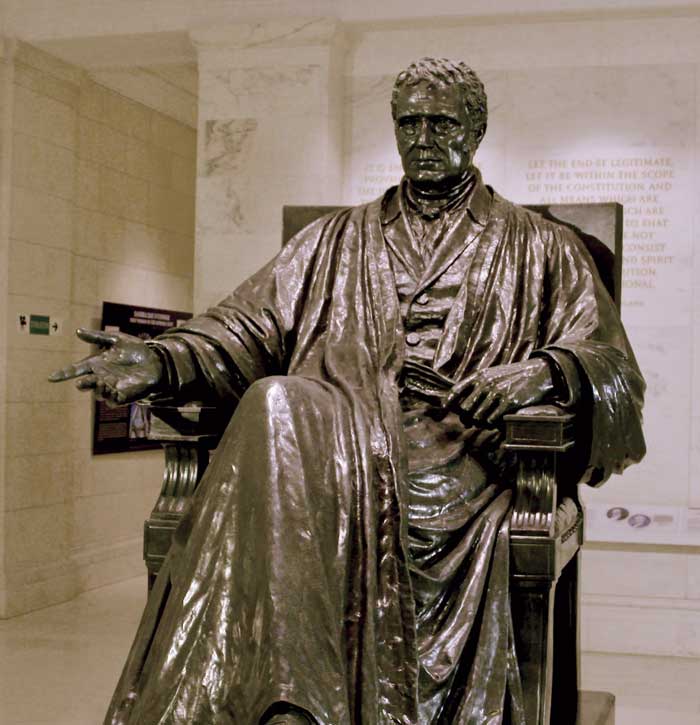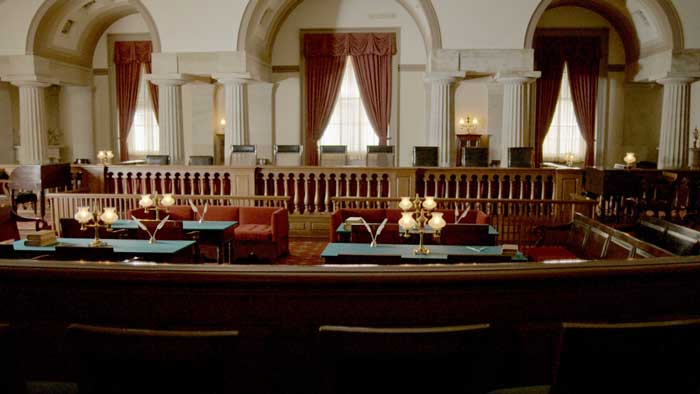 John Marshall’s landmark decisions reflect his brilliant mind, his brief but excellent legal training, and the shining example of his Revolutionary War commander and hero George Washington that would inspire and motivate Marshall throughout his life.
John Marshall’s landmark decisions reflect his brilliant mind, his brief but excellent legal training, and the shining example of his Revolutionary War commander and hero George Washington that would inspire and motivate Marshall throughout his life.

Statue of John Marshall in US Supreme Court
Marbury v. Madison was a lecture in political ethics to Marshall’s cousin and rival Thomas Jefferson, and a declaration that federal courts had a duty to reject federal laws that violated the Constitution.
In the treason trial of former vice president Aaron Burr, he showed that even dodgy characters accused of grave crimes were entitled to a strict respect of their rights, and not even the President of the United States was above the law.
Dartmouth v. Woodward gave definition to the modern corporation, and forbade states from altering contracts after the fact. McCulloch v. Maryland expanded, within limits, the constitutional powers of Congress while Gibbons v. Ogden placed interstate commerce firmly under the federal government’s control.

Old Supreme Court Chamber in US Capitol, where Marshall presided from 1819 to 1835
In the Antelope case, Marshall tragically upheld the legality of the international slave trade, so long as it was conducted by foreigners. But in Worcester v. Georgia he boldly—and vainly—defended the Cherokee nation against a state determined to destroy it. His opinion, ignored at the time, is today the basis of all Native American tribal sovereignty.
For thirty-four years as Chief Justice, Marshall fought for a strong national economy, a strong federal government, and a strong union. We live in the nation he envisioned.

John Marshall’s landmark decisions reflect his brilliant mind, his brief but excellent legal training, and the shining example of his Revolutionary War commander and hero George Washington that would inspire and motivate Marshall throughout his life.
Marbury v. Madison was a lecture in political ethics to Marshall’s cousin and rival Thomas Jefferson, and a declaration that federal courts had a duty to reject federal laws that violated the Constitution.

Statue of John Marshall in US Supreme Court
In the treason trial of former vice president Aaron Burr, he showed that even dodgy characters accused of grave crimes were entitled to a strict respect of their rights, and not even the President of the United States was above the law.
Dartmouth v. Woodward gave definition to the modern corporation, and forbade states from altering contracts after the fact. McCulloch v. Maryland expanded, within limits, the constitutional powers of Congress while Gibbons v. Ogden placed interstate commerce firmly under the federal government’s control.

Old Supreme Court Chamber in US Capitol, where Marshall presided from 1819 to 1835
In the Antelope case, Marshall tragically upheld the legality of the international slave trade, so long as it was conducted by foreigners. But in Worcester v. Georgia he boldly—and vainly—defended the Cherokee nation against a state determined to destroy it. His opinion, ignored at the time, is today the basis of all Native American tribal sovereignty.
For thirty-four years as Chief Justice, Marshall fought for a strong national economy, a strong federal government, and a strong union. We live in the nation he envisioned.